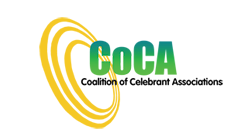- That professional development activities are based on the premises that:
• independent civil celebrants are part of a profession of celebrancy
• the profession of Subdivision C Marriage Celebrants, like the other Subdivisions of Marriage Celebrants
is broader than simply providing marriage services and that celebrants provide ceremonies other than marriage as part of their professional or public service roles. - Professional development activities reflect the premise that Adult Learning Principles support the inclusion of topics on other ceremonies in the range of professional development activities for Subdivision C independent Marriage Celebrants.
- That those professional development providers approved by the AGD be delegated the responsibility of providing and reporting upon professional development activities within a specified set of Departmental guidelines, without the need for AGD’s prior approval of individual units.
- That units of the Certificate IV of Celebrancy “ be approved professional development activities for those celebrants wanting to upgrade or extend their qualifications.
- That professional celebrant Associations be delegated the responsibility
a.) providing professional development activities, in conjunction with AGD approved OPD providers or with appropriate educationalists, in the form of seminars, workshops, conferences and online activities, and
b.) supplying the Department with the compliance records of those celebrants who completed their annual professional development requirements in addition to the current system of four approved OPD providers for the short term until the review of celebrancy qualifications in 2020. - That, in regard to professional development, the AGD role be to:
a.) determine the OPD providers and professional Associations to be approved to deliver OPD activities, and approve any other activities (e.g. Cert IV units)
b.) establish and review the guidelines for the scope, delivery and evaluation of OPD activities in consultation with the profession, leaving the responsibility of how that material is to be covered to the providers who have the expertise to design and deliver educational sessions
c.) establish reporting mechanisms for use by all OPD providers and from individual celebrants reporting their OPD compliance via the portal
d.) provide advice about any Compulsory Activities required in a specific OPD year, along with resourcing the OPD providers with the learning objectives and the relevant supporting legal information and resources
e.) provide advice via individual email to Celebrants and Associations on any new legislation, or areas of specific legal concern in the form of fact sheets or explanatory materials or additional sections to the Guidelines. - That the number of hours of OPD be 5 hours.
- That Marriage Celebrants be required to do a one-hour compulsory legal refresher activity until a review in 2020, even when there are no significant changes to the relevant legislation or guidelines.
- That the best ways to ensure that Marriage Celebrants are advised of changes to legislation are:
• Publications on the Attorney-General’s Department website
• Fact sheets, emails, newsletters circulated directly to celebrants
• Marriage Celebrants’ self-service portal
• eLearning module (or similar online based training). - That the OPD year remains a calendar year.
- That the Conflict of Interest (COI) and Benefit to Business (B2B) provisions be retained and strengthened to continue to provide parity with Subdivisions A and B Authorised Celebrants.
- That civil marriage services be acknowledged as one component of the Civil Celebrancy profession, where the celebrant provides a range of ceremonies if they so choose, and not a business activity within the Wedding Industry where the celebrant provides other commercial wedding services that the public would not expect to be provided by Subdivision A Ministers of Recognised Religions nor of Subdivision B State and Territory Officers.
- That the terminology used in the Marriage Act and Marriage Regulations be strengthened, and more clearly specify the types of activities that are and those that are not considered a conflict of interest or benefit to business with the view to narrowing those areas in dispute.
- That in determining whether an activity has an actual or potential Conflict of Interest and Benefit to Business risk, the focus be on how that activity enables the independent celebrant to strengthen their primary ceremonial role (i.e. ceremony and celebration knowledge, values, skills and support) with the other two Subdivisions A and B as a guide, not the work opportunities within the commercial wedding industry.
- That where there are concerns about the overlap between “Profession” and “Business”, that the focus be on how a potential Conflict of Interest and Benefit to Business enables the independent celebrant to strengthen their primary ceremonial role (i.e. ceremony and celebration knowledge, values, skills and support) with the other two Subdivisions A and B as a guide).
- That the Attorney-General’s Department reconsiders its own definitions of the Conflict of Interest and Benefit to Business in regard to authorised celebrants charging for services directly related to the ceremony itself, especially those normally included in services charged by Ministers of Recognised Religions and Registry Offices.
Executive Summary
Professional Development: Recommendations
COI and B2B: Recommendations
References
Appendix 1


